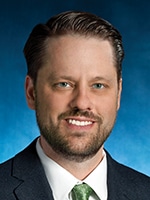
Dr. Bishop
On Dr. Bishop’s wish list for future versions is “more granularity in what I can search. Most helpful would be the addition of a NOT feature,” he told CAP TODAY. “For example, when I search salivary gland oncocytomas [a rare condition], I end up getting a lot of renal oncocytomas. In this scenario, I’d like to be able to search ‘oncocytoma’ AND NOT ‘renal’ OR ‘kidney.’”
Based on lessons learned during her time at UT Southwestern, Dr. Arvisais-Anhalt, who is now a clinical informatics fellow at the University of California San Francisco, is laying the groundwork to develop a similar tool at UCSF. Among the strengths of UT Southwestern’s tool is that it is EHR and LIS agnostic, she says. “It’s not tied to your vendor—it’s just a matter of connecting Tableau to your clinical data warehouse.” Yet gaining access to the Epic Clarity data warehouse can be tricky. “Access varies depending on how governance and security practices have been set up,” Dr. Arvisais-Anhalt notes, a consideration for those interested in replicating UT Southwestern’s project. UCSF offers access to Clarity only for clinical informatics fellows and designated clinical informatics personnel. And those staff members must first become certified in the use of Clarity, which differs from the requirements at UT Southwestern.
Yet the Tableau search tool has advantages over an LIS with built-in text-search capability, Dr. Arvisais-Anhalt contends, because large queries can stall a lab system. In addition, with a built-in LIS tool, users may be limited in how far back they can search because of how the lab system’s operational databases are organized. In contrast, she says, “when you hook directly into your clinical data warehouse—especially if the clinical data warehouse has archived a lot of data from previous years—your reach, in terms of how far back you can go, is much further.”
Looking to the future, Dr. Arvisais-Anhalt says other hospital departments could benefit from using a similar search tool. It lends itself to any report-driven field that needs to query unstructured text, such as radiology or, on the clinical pathology side, microbiology and molecular pathology, she explains. “Today,” she adds, “we’re much more familiar with what it means to analyze structured data. Unstructured text is the next horizon.”
—Charna Albert
Pramana launches platform to digitize pathology slides
Pramana has introduced a digital-pathology-as-a-service platform for digitizing standard-format glass slides and announced a commercial agreement with Mayo Clinic.
The company’s automated solution digitizes archival pathology slides at scale to meet the needs of pathologists, clinicians, and researchers. As part of the service, Pramana will send technicians to customer sites to operate its scanners. Clients are charged on a per-slide basis and have no equipment costs.
“It is often misconstrued that the challenges with going digital for tissue and body fluid slides end with the purchase of a scanner,” said Prasanth Perugupalli, chief product officer for Pramana, in a company press statement. “We realized that the greater pain and costs lie in the human capital needed to operate the scanners, which includes making the correct parametric selections and qualifying each whole slide image for any errors after the scanning is completed.”
Pramana’s intelligent whole slide image-acquisition system places slides in position for scanning and can scan four slides simultaneously. It uses proprietary algorithms to assess the quality of slides during the digitization process and can rescan slides as needed. A single unit, consisting of one robot with four heads, can process more than 1,000 slides per day. A technician can oversee up to five units at once, generating more than 5,000 slides per day.
In its first commercial agreement for the service, Pramana signed a three-year deal with Mayo Clinic to digitize 5 million slides.
CDC establishes center to address public health threats
The Centers for Disease Control and Prevention recently launched the Center for Forecasting and Outbreak Analytics, with the goal of improving the ability to use data, models, and analytics in timely decision-making when responding to public health threats.
“CFA will produce models and forecasts to characterize the state of an outbreak and its course, inform public health decision-makers on potential consequences of deploying control measures, and support innovation to continuously improve the science of outbreak analytics and modeling,” according to a CDC website posting.
The center has begun building an outbreak analytics team that will be made up of experts across several disciplines. The team will develop evidence to predict trends and guide decision-making during emergencies.
Proscia to add Visiopharm AI applications to Concentriq Dx
Proscia and Visiopharm have expanded their strategic partnership by striking a deal whereby Proscia will integrate Visiopharm’s suite of CE-IVD artificial intelligence-based clinical applications, including breast IHC markers and solutions to detect breast and colon cancer metastases, with Proscia’s CE-IVD Concentriq Dx platform for image-based data and workflow management.
Proscia’s Concentriq Dx platform is available for in vitro diagnostic use in the United States during the COVID-19 pandemic under an FDA emergency use authorization. Visiopharm’s clinical AI applications are available for research use only in the United States and are not covered under the EUA for Concentriq Dx.
Concentriq Dx will offer the full suite of Visiopharm AI applications to quantify the expression of biomarkers.
Proscia, 215-608-5411
PreciseMDX inks deal with Vanguard Laboratories
Salt Lake City-based Vanguard Laboratories has contracted with PreciseMDX for the PreciseMDX digital health platform. The platform will be integrated with Vanguard’s laboratory information management system to enhance the molecular laboratory’s PCR and diagnostic testing operations.
PreciseMDX, 866-462-4677
Dr. Aller practices clinical informatics in Southern California. He can be reached at raller@usc.edu. Dennis Winsten is founder of Dennis Winsten & Associates, Healthcare Systems Consultants. He can be reached at dwinsten.az@gmail.com.
 CAP TODAY Pathology/Laboratory Medicine/Laboratory Management
CAP TODAY Pathology/Laboratory Medicine/Laboratory Management
